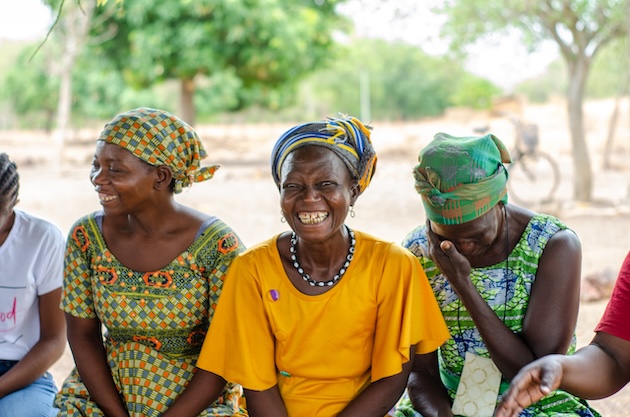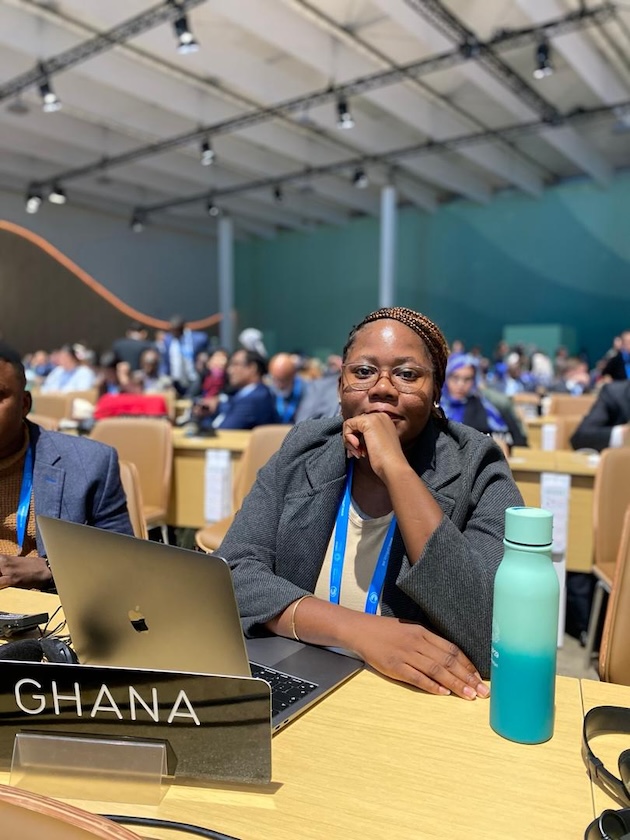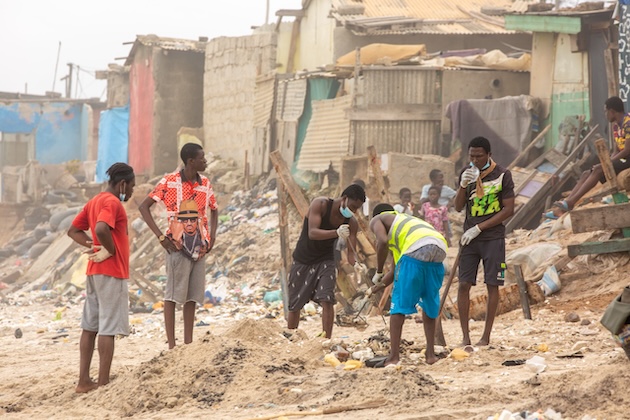BAKU, Nov 21 (IPS) – As climate change wreaks havoc across the globe, its effects are most acutely felt by those living in vulnerable coastal and rural communities.
In Ghana, the Climate Development Knowledge Network (CDKN) has embarked on a groundbreaking initiative that merges climate resilience with an often-overlooked aspect of the crisis: mental health.
For Valerie Nutakor, CDKN’s Programme Assistant in Ghana, the urgency of the work is clear. “When people lose their homes, livelihoods, and dignity, the damage isn’t just physical—it’s deeply psychological. If their minds are broken, how can they rebuild their lives?”
In Shabu, a coastal community devastated by rising sea levels, homes have been swept away, livelihoods destroyed, and hope eroded. The stress is palpable, with residents voicing despair. “We are tired,” they say. “How do we take action when our world keeps collapsing around us?”
The project provides psychological support to empower communities like Shabu, where rising tides have displaced families, destroyed businesses, and fractured dreams.

From Tears to Resilience
One poignant story from Shabu underscores the stakes. A local man who once owned a thriving recreational center now stands amid its ruins, drowning in debt. “Two years ago, I had a business, a family home, and a future,” he said, breaking into tears. “Today, I have nothing.”
For many, this emotional devastation has paralyzed action. Women, whose husbands are often fishermen, face a double burden. “Their husbands are at sea, their children are migrating for better lives, and they are left to fend for themselves amidst the wreckage,” Nutakor explains.
Through one-on-one and group therapy sessions, the Climate Mental Health Initiative Project (CMHIP) initiative helps individuals reclaim their agency. “A mind that feels inadequate cannot act,” Nutakor emphasizes. “But when we provide psychological intervention, we see transformation. People begin to believe that they can make a difference.”

Empowering Women Through Song and Story
While addressing mental health, CDKN is also amplifying the voices of women in northern Ghana’s Upper West region. Here, smallholder farmers and women navigate extreme climate challenges with remarkable resilience.
“We realized that these women were already building resilience through indigenous practices but lacked the technical knowledge to enhance their efforts,” Nutakor explains.
CDKN bridged this gap through an innovative storytelling initiative. Women’s experiences with climate risks were transformed into community songs. These songs, rooted in folk traditions, weave together lived experiences and new knowledge, becoming powerful tools for awareness and advocacy.
“When we helped them record and broadcast these songs on local radio, the women felt seen and heard for the first time,” Nutakor shares. “In a patriarchal community, this was a groundbreaking moment.”
The songs resonated beyond their immediate communities, inspiring others to take action. “It’s a ripple effect,” Nutakor says. “When one woman stands up, others see what’s possible.”
Mental Health and Action: A New Beginning
Back in Shabu, the impact of the mental health initiative is tangible. After therapy sessions, residents took the first step towards rebuilding their community—a beach cleanup. For Nutakor, this was a symbolic moment. “As they cleaned their beaches, it felt like they were also cleansing their minds, making space for hope and action.”
This newfound agency challenges the common narrative that the government must solve every problem. “We helped them see that they can take the lead,” Hagan explains. “Once they felt empowered, their actions followed naturally.”
The project also engaged local leaders, teachers, and nurses, creating a network of support. “We don’t believe in top-down solutions,” Nutakor asserts. “We believe in co-creating with the community so that the solutions are theirs, not imposed.”
Changing the Climate Conversation
CDKN’s approach isn’t just about interventions—it’s about shifting narratives. “Too often, we focus on people’s vulnerabilities,” Nutakor says. “But these communities are not just victims; they are innovators and problem-solvers.”
By addressing mental health alongside physical and economic challenges, CDKN is redefining climate resilience. “This is more than an environmental crisis—it’s a human one,” Nutakor emphasizes. “And healing minds is as important as healing the planet.”
A Call to Action
As global leaders discuss climate solutions at COP29, Nutakor has a message: “Real change starts with the people most affected. If we don’t empower their minds, no policy will succeed.”
In Shabu and the Upper West region, CDKN’s work offers a powerful example of what’s possible when mental health and empowerment are at the forefront of climate action. For the communities they serve, it’s a lifeline—and a path forward.
“Development is not just about infrastructure,” Nutakor concludes. “It’s about people feeling valued, capable, and ready to take on the challenges they face. That’s how we create real, lasting change.
IPS UN Bureau Report
Follow @IPSNewsUNBureau
Follow IPS News UN Bureau on Instagram
© Inter Press Service (2024) — All Rights ReservedOriginal source: Inter Press Service




